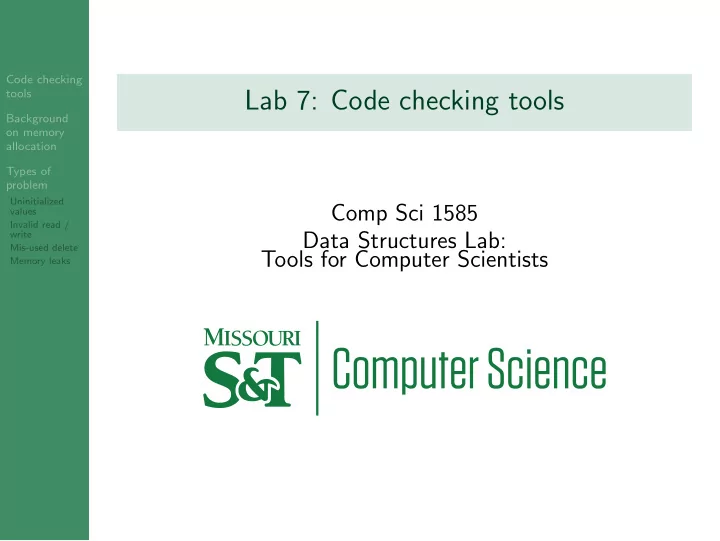

Code checking tools Lab 7: Code checking tools Background on memory allocation Types of problem Uninitialized Comp Sci 1585 values Invalid read / write Data Structures Lab: Mis-used delete Tools for Computer Scientists Memory leaks
Outline Code checking tools Background on memory allocation 1 Code checking tools Types of problem Uninitialized values Invalid read / write 2 Background on memory allocation Mis-used delete Memory leaks 3 Types of problem Uninitialized values Invalid read / write Mis-used delete Memory leaks
Code Checking Tools Code checking tools Background on memory allocation Types of problem Today we will talk about tools that will help you find bugs in Uninitialized values your code. Invalid read / write Mis-used delete Memory leaks • valgrind and its memcheck tool • asan is part runtime library, part compiler feature that instruments your code at compile time.
Outline Code checking tools Background on memory allocation 1 Code checking tools Types of problem Uninitialized values Invalid read / write 2 Background on memory allocation Mis-used delete Memory leaks 3 Types of problem Uninitialized values Invalid read / write Mis-used delete Memory leaks
Stack and Heap Recall the stack frames in GDB Code checking tools (which you can navigate through using bt, up, down, etc) Background on memory allocation Types of problem Uninitialized values Invalid read / write Mis-used delete Memory leaks
Stack and Heap Code checking tools Background on memory allocation Types of problem Uninitialized values Invalid read / write Mis-used delete Memory leaks
Stack and Heap Code checking tools Background on memory allocation Types of • The stack (on x86) starts at a high address and grows problem Uninitialized down values Invalid read / write • The heap (on x86) starts at the bottom and grows up Mis-used delete Memory leaks • Destructors on stack-allocated class instances are called when the function returns • Destructors on heap-allocated class instances are called when delete is called on the pointer
Outline Code checking tools Background on memory allocation 1 Code checking tools Types of problem Uninitialized values Invalid read / write 2 Background on memory allocation Mis-used delete Memory leaks 3 Types of problem Uninitialized values Invalid read / write Mis-used delete Memory leaks
Types of problem Code checking tools Background on memory allocation Types of problem 1 Uninitialized values Uninitialized values 2 Unallocated or out-of-bounds read / write Invalid read / write • Out-of-bounds stack access Mis-used delete Memory leaks • Out-of-bounds heap access • Use after free 3 Mismatched or double delete 4 Memory leaks
Outline Code checking tools Background on memory allocation 1 Code checking tools Types of problem Uninitialized values Invalid read / write 2 Background on memory allocation Mis-used delete Memory leaks 3 Types of problem Uninitialized values Invalid read / write Mis-used delete Memory leaks
Uninitialized Values: valgrind, memory-sanitizer Code checking tools Background on memory allocation • Reading a value that hasn’t been initialized from the stack Types of or the heap. problem Uninitialized values • Especially dangerous when program flow depends on that Invalid read / write value. Mis-used delete Memory leaks • valgrind $ valgrind --track-origins=yes keeps track of where uninitialized values were allocated. • asan is faster $ g++ -g -fsanitize=address -fno-omit-frame-pointer invalid-stack.cpp -o invalid-stack and set environment variables (script provided today in repo: symbolizer.sh )
Outline Code checking tools Background on memory allocation 1 Code checking tools Types of problem Uninitialized values Invalid read / write 2 Background on memory allocation Mis-used delete Memory leaks 3 Types of problem Uninitialized values Invalid read / write Mis-used delete Memory leaks
Invalid Reads / Write: valgrind, address-sanitizer Code checking tools Background on memory allocation Types of • Reading or writing values from unallocated memory. problem Uninitialized • Sometimes may result in a segfault, but not always. values Invalid read / write • valgrind isn’t perfect: Mis-used delete Memory leaks you can read and write to things on the stack without complaint, though it can detect out-of-bounds heap access and use-after-free. • asan works for all of these types: $ g++ -g -fsanitize=address -fno-omit-frame-pointer invalid-stack.cpp -o invalid-stack
Outline Code checking tools Background on memory allocation 1 Code checking tools Types of problem Uninitialized values Invalid read / write 2 Background on memory allocation Mis-used delete Memory leaks 3 Types of problem Uninitialized values Invalid read / write Mis-used delete Memory leaks
Misused delete: valgrind, address-sanitizer Code checking tools Background on memory allocation Types of problem 1 Mismatched delete, using: Uninitialized values new with delete[] or Invalid read / write new[] with delete Mis-used delete Memory leaks Both are problematic, why? 2 Double delete: deleting the same memory twice. Why is this an issue? valgrind and asan can both detect both
Outline Code checking tools Background on memory allocation 1 Code checking tools Types of problem Uninitialized values Invalid read / write 2 Background on memory allocation Mis-used delete Memory leaks 3 Types of problem Uninitialized values Invalid read / write Mis-used delete Memory leaks
Memory Leaks: valgrind Code checking tools Valgrind runs leak checks after the program terminates: Background on memory • Directly lost: No pointer to that block anymore. allocation Types of • Indirectly lost: A pointer to that block exists, but it’s in problem a directly lost block. Uninitialized values Invalid read / • Still reachable: Still have a pointer to that block (don’t write Mis-used delete worry about this) Memory leaks • Possibly lost: No pointer to the beginning of the block, but a pointer to somewhere inside the block. • $ valgrind --leak-check=full may help you determine where • Valgrind Memcheck Manual: http://valgrind.org/docs/manual/mc-manual.html The first two are the important ones to check for on homeworks
Recommend
More recommend